If you suffer from GERD, choosing low acid coffee can make a significant difference. Options like Lucy Jos Organic Mellow Belly and Julian Coffee Whole Bean provide smoother flavors without harsh acidity. VitaCup and Lifeboost focus on organic ingredients and offer rich tastes while being gentle on the stomach. For convenience, consider Puroast single-serve pods. These coffees generally have less than 70% acidity and are suitable for sensitive drinkers. Continue on to explore specific products and valuable tips for enjoying your coffee comfortably.
At a Glance
- Low acid coffee blends, like Lucy Jos and Lifeboost, can reduce discomfort and heartburn for GERD sufferers.
- Specialty grade options, such as Julian Coffee, offer rich flavors while maintaining low acidity levels.
- Mycotoxin-free choices, like VitaCup, ensure a pure coffee experience without harmful contaminants.
- Cold brew methods can further lower acidity, making it easier on sensitive stomachs.
- Many low acid coffees emphasize organic and ethical sourcing, contributing to overall health benefits.
Lucy Jos Organic Mellow Belly Low Acid Coffee Blend (11 oz)
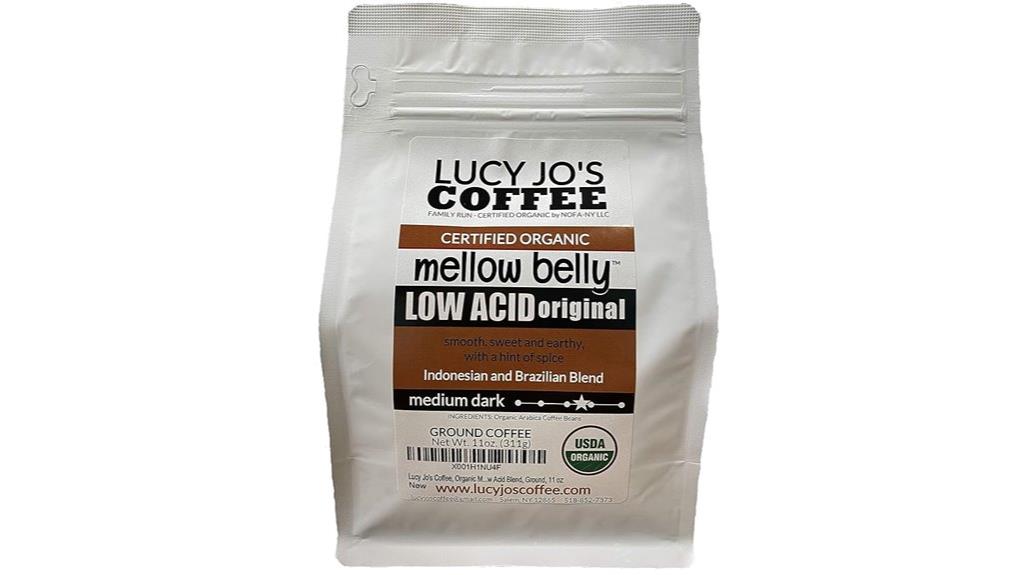
If you’re looking for a coffee that’s gentle on your stomach, Lucy Jos Organic Mellow Belly Low Acid Coffee Blend (11 oz) is an excellent choice for GERD sufferers. This medium-dark blend features 100% organic Arabica beans sourced from Indonesia and Brazil. Hand-roasted in small batches, it delivers a smooth, sweet, and earthy flavor with a touch of spice. Customers appreciate its soothing qualities, reporting relief from discomfort typically associated with regular coffee. With a commitment to quality, Lucy Jos Coffee Roastery guarantees you enjoy a satisfying cup without adverse reactions, making it a great option for those with digestive concerns.
Best For: Individuals with digestive issues like IBS or GERD seeking a low acid coffee option.
Pros:
- Smooth, sweet, and earthy flavor with a hint of spice.
- Certified organic, ensuring high quality and no filler beans.
- Positive customer feedback regarding relief from discomfort associated with regular coffee.
Cons:
- Some reports of packaging inconsistencies, such as bag fullness.
- Occasional quality control issues noted by customers.
- May not suit those who prefer stronger, higher-acid coffee blends.
Julian Coffee – Whole Bean Specialty Grade Arabica Coffee (12oz)
https://m.media-amazon.com/images/I/613vTlV3bbL._SX679_.jpg
Julian Coffee – Whole Bean Specialty Grade Arabica Coffee is an excellent choice for GERD sufferers due to its low acidity and smooth flavor profile. Sourced from Puerto Rico, this specialty grade coffee is made from ripe red beans, ensuring a non-bitter, chocolaty taste. Shade-grown under plantain trees, the beans thrive at an elevation of 2,300 feet in nutrient-rich soil. Customers often praise its delightful aroma and smoothness, making it perfect for upscale brunches or special occasions. While some reviews mention a metallic taste, many agree that its quality justifies the price, elevating your coffee experience without the burn.
Best For: Those seeking a high-quality, low-acidity coffee that offers a smooth and chocolaty flavor profile, particularly beneficial for GERD sufferers.
Pros:
- Specialty grade Arabica coffee with low acidity, making it gentle on the stomach.
- Rich, chocolaty flavor and delightful aroma enhance the coffee-drinking experience.
- Sourced from Puerto Rico, supporting fair wages for coffee pickers and revitalizing local production.
Cons:
- Some customers reported a metallic taste, indicating potential variability in flavor.
- Higher price point may raise skepticism among budget-conscious buyers.
- Limited availability may make it harder to purchase consistently.
VitaCup Perfect Low Acid Coffee Ground (11 ounces)
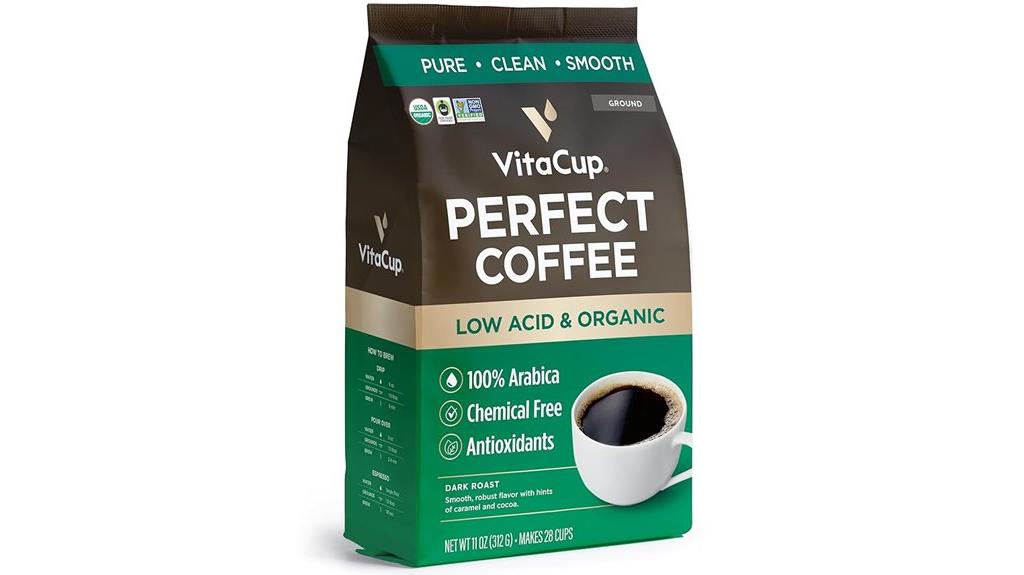
VitaCup Perfect Low Acid Coffee Ground is an excellent choice for individuals seeking a coffee that is gentler on the stomach, particularly those with GERD or acid reflux issues. This USDA Organic and Fair Trade coffee features a smooth, chocolaty taste, sourced from high-altitude Guatemala. It’s made from 100% dark roast Arabica beans and is mycotoxin-free, ensuring purity and quality. You can brew it easily with various coffee makers, including French presses and reusable K-cups. Many users appreciate its low acidity and find it easier on the stomach, making it a worthy option despite its higher price point.
Best For: Individuals with GERD or acid reflux issues seeking a low acid, organic coffee option.
Pros:
- Smooth, chocolaty taste that is gentle on the stomach.
- USDA Organic, Fair Trade, and mycotoxin-free, ensuring high quality.
- Compatible with various brewing methods, including French press and reusable K-cups.
Cons:
- Higher price point compared to average coffee options.
- Limited availability in some areas.
- Some users may prefer a stronger flavor profile.
Lifeboost Coffee Ground Medium Roast Coffee – Low Acid USDA Organic Coffee (12 Ounces)
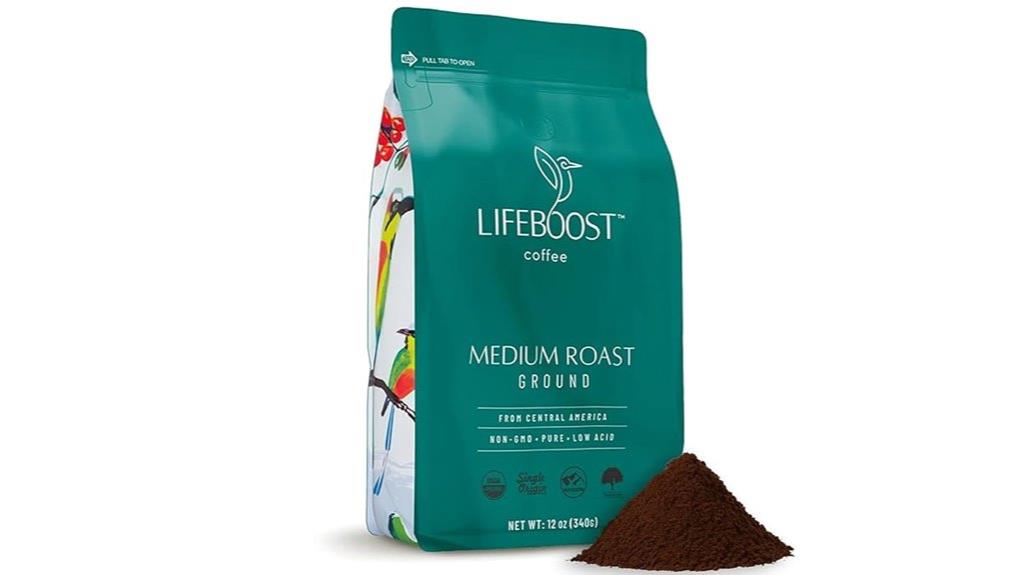
Lifeboost Coffee Ground Medium Roast Coffee stands out as an ideal choice for GERD sufferers due to its low acid formulation. This USDA Organic coffee is ethically sourced and non-GMO, ensuring premium quality. Grown at high elevations in Central America, each bean is hand-selected for purity and sun-dried for maximum flavor. With its low acid content, you can enjoy your coffee without the discomfort that often comes with traditional brews. Additionally, it’s rich in antioxidants, offering health benefits without unwanted side effects. Plus, Lifeboost promises satisfaction with a 30-day guarantee, so you can confidently give it a try.
Best For: Lifeboost Coffee is best for individuals who suffer from GERD or acid sensitivity but still want to enjoy a flavorful cup of coffee.
Pros:
- Low acid formulation helps reduce stomach discomfort and teeth issues.
- USDA Certified Organic and ethically sourced, ensuring high-quality ingredients.
- Rich in antioxidants, providing health benefits without unwanted side effects.
Cons:
- Higher price point compared to standard coffee brands.
- Limited availability as it’s sourced from exclusive farms.
- Flavor preference may not appeal to everyone, especially those who prefer stronger, more acidic coffee.
Puroast Low Acid Coffee House Blend Single Serve Pods (24 Count)
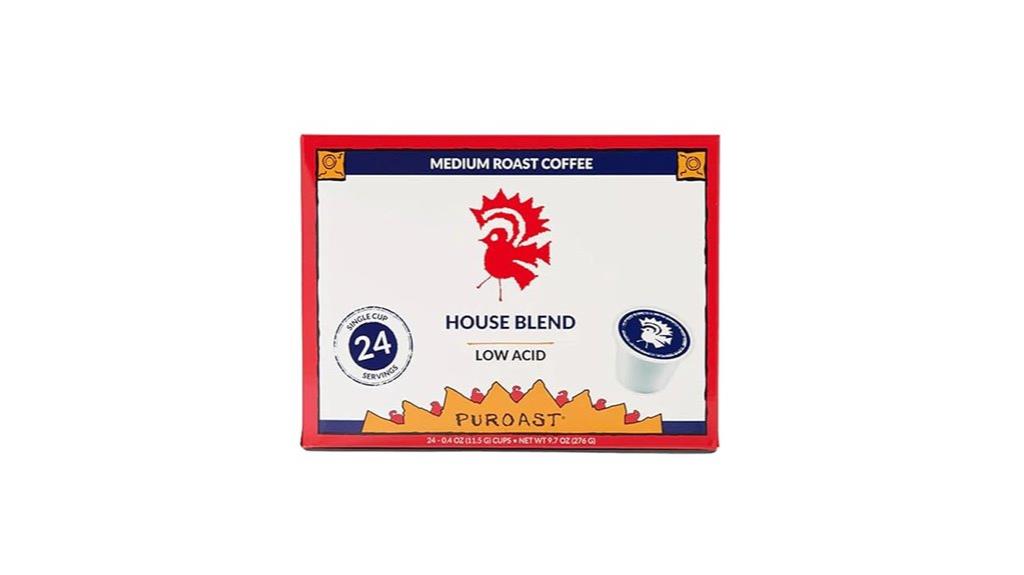
If you’re looking for a coffee that won’t aggravate your GERD symptoms, Puroast Low Acid Coffee House Blend Single Serve Pods are an excellent choice. These medium roast pods contain 70% less acid, making them gentle on sensitive stomachs. You’ll enjoy a smooth, flavorful experience without the bitter aftertaste often found in regular coffee. Rich in antioxidants, Puroast provides seven times more than green tea, supporting digestive health. Made from premium, all-natural beans, these pods are compatible with Keurig brewers. While some users report occasional issues with pod integrity, many appreciate the coffee’s taste and its gut-friendly qualities. For those who appreciate a more traditional brewing method, Puroast also offers the best whole bean espresso choices, allowing you to craft the perfect cup tailored to your preference. Whether you choose the single serve pods or the whole beans, you can savor an aromatic blend that elevates your coffee experience while prioritizing your gut health. Many loyal customers find themselves returning to Puroast for its consistent quality and delicious flavor.
Best For: Individuals with sensitive stomachs or GERD symptoms seeking a low-acid coffee option.
Pros:
- Rich in antioxidants, providing 7x more than green tea.
- Compatible with Keurig brewers and various brewing methods.
- Smooth flavor without a bitter aftertaste, ideal for digestive health.
Cons:
- Some users report issues with pod integrity, such as breaking and leaking.
- Flavor inconsistencies noted in recent batches.
- Considered expensive by some customers.
VitaCup Perfect Low Acid Coffee Pods, Dark Roast Guatemala (16 CT)
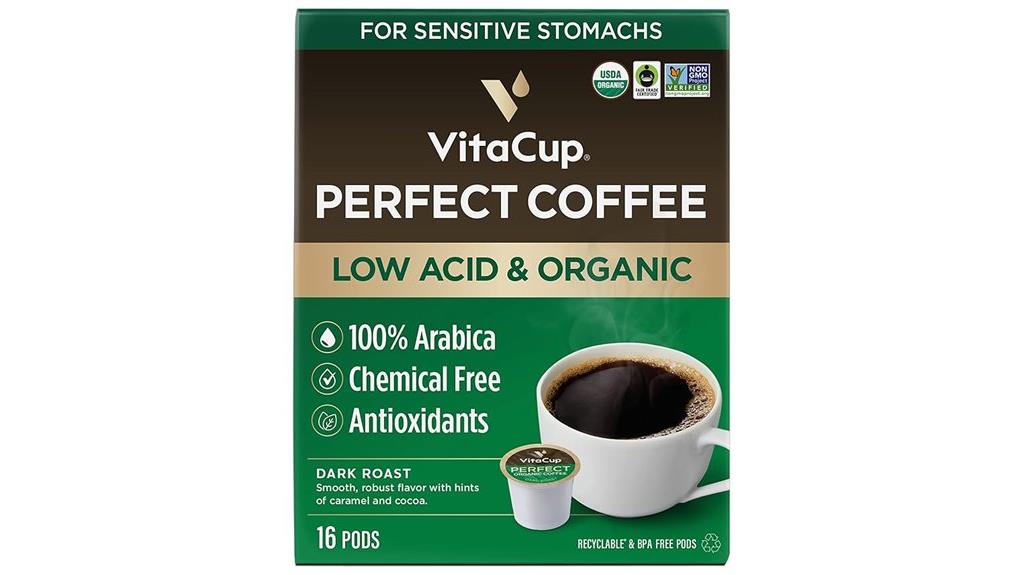
For those struggling with GERD or acid reflux, the VitaCup Perfect Low Acid Coffee Pods, Dark Roast Guatemala, offer a promising solution. These USDA Organic and Fair Trade pods feature 100% dark roast Arabica coffee sourced from high-altitude regions in Guatemala. With a smooth, chocolatey taste, they provide a robust flavor without the harsh acidity that can trigger discomfort. Each pod is compatible with Keurig K-Cup brewers and is mycotoxin-free, ensuring purity. Many users report enjoying coffee without stomach issues, although opinions on flavor may vary. The recyclable, BPA-free packaging highlights an environmentally conscious approach to your coffee experience.
Best For: Individuals with GERD or acid reflux who want to enjoy coffee without discomfort.
Pros:
- USDA Organic and Fair Trade certified, ensuring ethical sourcing.
- Low acid formulation offers a smooth, chocolatey flavor that is gentle on the stomach.
- Recyclable and BPA-free packaging promotes environmental sustainability.
Cons:
- Some users may find the flavor does not meet their expectations.
- Higher cost compared to regular coffee options.
- Mixed customer service experiences reported by some buyers.
Puroast Low Acid Bourbon Pecan Torte Coffee (12 oz)
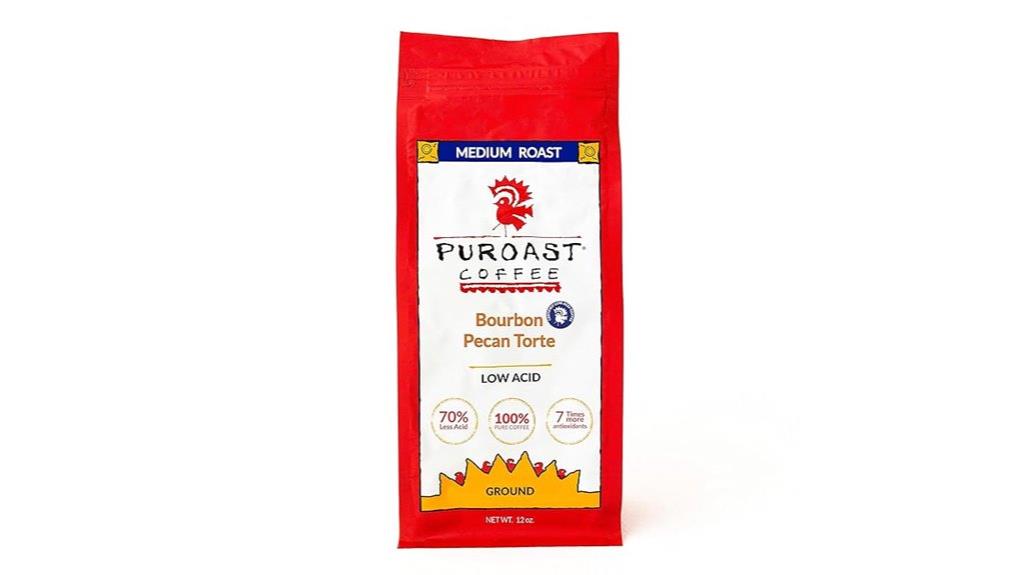
Puroast Low Acid Bourbon Pecan Torte Coffee (12 oz) stands out as an excellent option for those suffering from GERD due to its considerably lower acidity level, which is 70% less than traditional coffees. This medium roast offers a smooth, full-bodied flavor without bitterness, making it easy on your digestive system. With a pH level over 5.5, it supports digestive health and reduces heartburn. Packed with seven times more antioxidants than green tea, it’s a wellness booster too. You can brew it using various methods, although it may not perform well in Keurig machines due to the fine grind. Enjoy a flavorful cup without the burn!
Best For: Individuals with sensitivity to acidity, such as those suffering from GERD or heartburn, who still want to enjoy flavorful coffee.
Pros:
- Lower acidity: 70% less acid than traditional coffees, making it easier on the stomach.
- Rich in antioxidants: Contains seven times more antioxidants than green tea, promoting overall wellness.
- Versatile brewing options: Compatible with various brewing methods, allowing for a customized coffee experience.
Cons:
- Keurig compatibility issues: May not work well in Keurig machines due to the fine grind.
- Consistency concerns: Some customers report variability in strength and flavor, especially in pod form.
- Not suitable for those preferring strong coffee: The medium roast may not satisfy those who favor a bolder coffee profile.
Puroast Low Acid Organic French Roast Coffee Ground (12 oz)
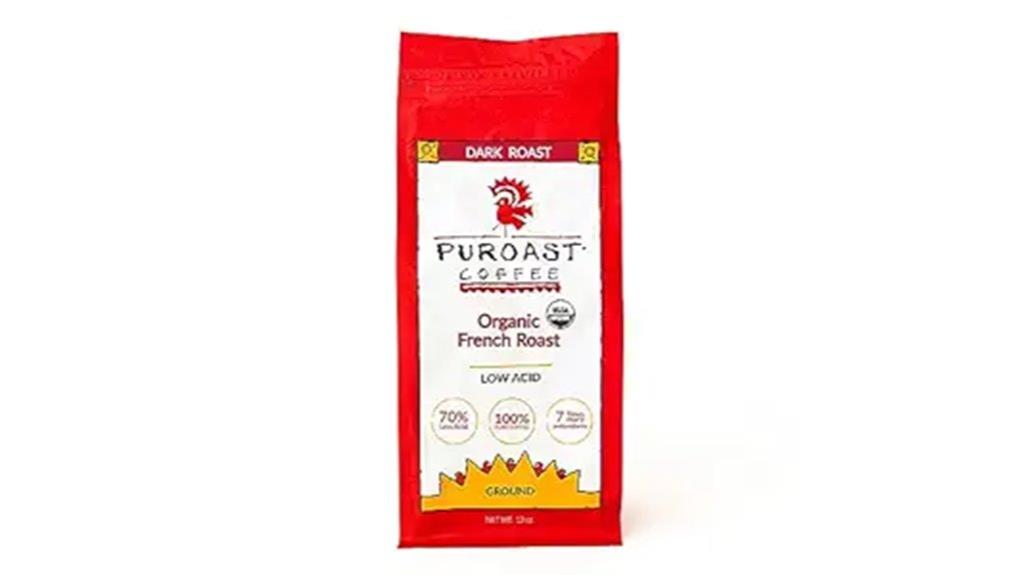
Designed specifically for those with acid sensitivity, Puroast Low Acid Organic French Roast Coffee Ground offers a smooth and flavorful experience without the discomfort often associated with traditional coffees. This dark roast coffee contains 70% less acid, making it gut-friendly and suitable for those with GERD. Importantly, it’s rich in antioxidants, boasting seven times more than green tea. You can enjoy it through various brewing methods, from drip to cold brew. Plus, it’s sustainably sourced and carbon neutral, ensuring you’re making an environmentally conscious choice. Overall, it’s a great option for coffee lovers who prioritize both taste and digestive health.
Best For: Those with acid sensitivity or digestive issues who still want to enjoy a flavorful cup of coffee.
Pros:
- Smooth and flavorful coffee with 70% less acid, ideal for sensitive stomachs.
- Rich in antioxidants, offering health benefits superior to green tea.
- Compatible with various brewing methods, including cold brew and espresso machines.
Cons:
- Mixed reviews regarding aroma and taste, with some users finding it unpleasant.
- May not satisfy those who prefer a stronger, traditional coffee flavor.
- Limited availability compared to more mainstream coffee brands.
VitaCup Perfect Low Acid Coffee Ground (11 ounces)
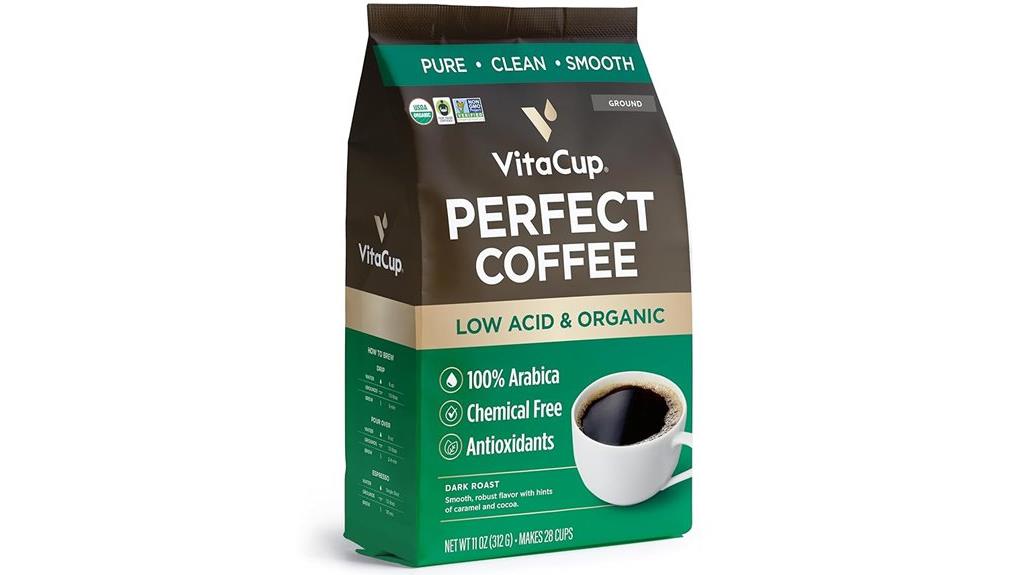
VitaCup Perfect Low Acid Coffee Ground is an excellent choice for those seeking a flavorful coffee option that won’t aggravate GERD symptoms. This USDA Organic and Fair Trade coffee is made from 100% dark roast Arabica beans sourced from high altitudes in Guatemala. The smooth, chocolaty taste is easier on your stomach compared to regular coffee. It’s third-party lab tested for purity, ensuring a clean cup every time. You can brew it using various methods, including drip coffee makers and French presses. Although it’s priced higher than some options, many users find the flavor and health benefits worthwhile.
Best For: Those seeking a smooth, low acid coffee option that is easy on the stomach and suitable for individuals with reflux issues.
Pros:
- USDA Organic and Fair Trade certified, ensuring ethical sourcing and quality.
- Smooth, chocolaty flavor that is gentle on the stomach, ideal for sensitive drinkers.
- Versatile brewing options compatible with various methods, including French press and cold brew.
Cons:
- Higher price point compared to some standard coffee options.
- Limited availability in some regions, making it harder to find.
- Taste may not appeal to those who prefer stronger, more acidic coffee flavors.
Clean Coffee Co. Low Acid Medium-Dark Roast (Ground, 12 oz Bag)
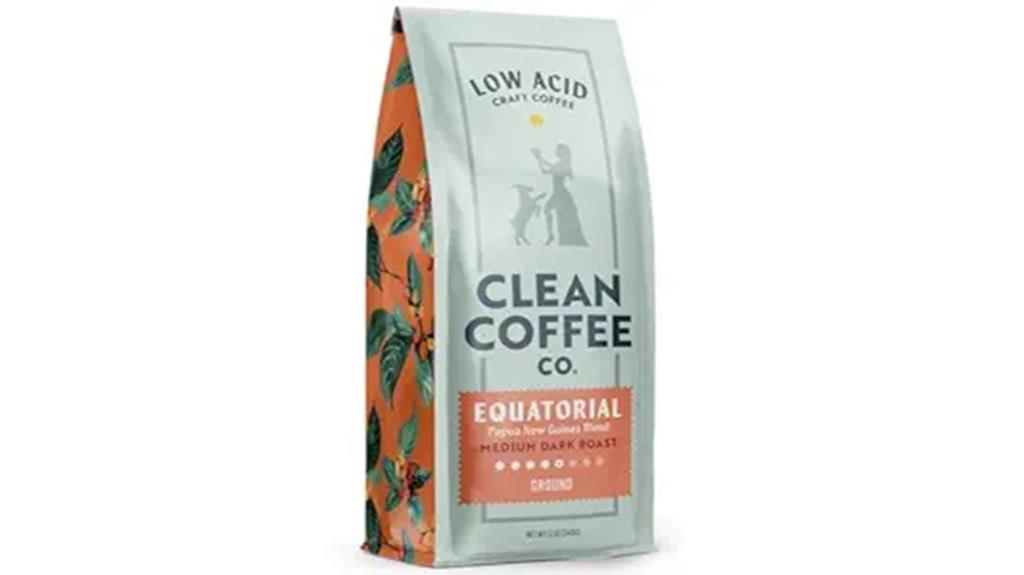
Clean Coffee Co. offers a low acid medium-dark roast coffee, featuring a Papua New Guinea blend. You’ll enjoy tasting notes of milk chocolate, roasted almonds, and vanilla. This coffee is specially roasted to lower acidic compounds, making it gentle on your stomach, which is perfect if you have sensitivities. It’s rigorously lab-tested for mold and chemicals, ensuring safety and quality. You can brew it using various methods like French press or cold brew, giving you flexibility. While many praise its smooth flavor, some customers have noted issues with freshness and quality control. Overall, it’s a solid choice for GERD sufferers.
Best For: Individuals with stomach sensitivities or those seeking a low-acid coffee option.
Pros:
- Smooth and rich flavor profile with notes of milk chocolate, roasted almonds, and vanilla.
- Specially roasted to reduce acidity, making it gentle on the stomach.
- Versatile brewing compatibility with methods like French press, pour-over, and cold brew.
Cons:
- Some customers report issues with freshness, receiving bags roasted over three months prior.
- A few negative reviews mention bland flavor or foreign objects found in the beans.
- Quality control concerns have been raised, affecting overall satisfaction for some users.
Factors to Consider When Choosing Coffees for GERD
When choosing coffee as a GERD sufferer, you’ll want to contemplate several important factors. Acid levels play a key role in how your body reacts, while flavor profiles can affect your overall enjoyment. Additionally, the brewing method, sourcing quality, and potential health benefits should also influence your decision.
Acid Levels Explained
Understanding coffee acidity is crucial for those managing GERD, as the acidity level can greatly impact your digestive comfort. Coffee acidity is measured using pH levels, with low-acid coffees typically having a pH above 5.5. These gentler options can help minimize discomfort and prevent acid reflux symptoms. High-acid coffees, on the other hand, can increase stomach irritation, making them less suitable for sensitive individuals. When selecting coffee, consider low-acid varieties, often produced through specific processing methods or sourced from regions known for their reduced acid profiles. Dark roasts and some medium roasts generally have lower acidity due to the longer roasting process. Drinking low-acid coffee not only offers a smoother taste but also reduces potential digestive issues associated with regular coffee.
Flavor Profiles Matter
Choosing the right coffee involves more than just picking a brand or blend; it’s essential to contemplate the flavor profiles that can influence your GERD symptoms. Low-acid coffee blends are smoother and less bitter, making them gentler on your stomach. Flavor notes like chocolatey, nutty, or earthy can offer a satisfying experience without worsening acid reflux. Specialty coffees grown at high elevations often have lower acidity, which can make them more enjoyable for sensitive individuals. Additionally, medium to dark roasts typically feature reduced acidity compared to lighter options, making them preferable. Opting for organic coffee can enhance flavor while minimizing exposure to irritating additives, further supporting your efforts to enjoy coffee without discomfort.
Brewing Methods Impact
The brewing method you choose can greatly impact the acidity levels in your coffee, which is essential for managing GERD symptoms. Cold brew is often recommended since it’s less acidic, thanks to its longer steeping process at lower temperatures. If you prefer French press, be cautious; while it offers bold flavors, it can extract more oils that increase acidity. Adjusting the steeping time can help mitigate this. Espresso, though flavorful, may exacerbate acidity levels, making it unsuitable for GERD sufferers. Finally, consider brewing with filtered water. It can enhance your coffee’s taste and reduce minerals that might elevate acidity in your cup, providing a smoother experience overall.
Sourcing and Quality
When you’re looking for coffee that’s easier on your stomach, considering the sourcing and quality of the beans is essential. Opt for 100% Arabica beans, as they typically have lower acidity levels, making them gentler on your digestive system. Specialty grade coffee undergoes strict quality control, ensuring fewer defects and improved flavor, which can enhance your coffee experience. Choose shade-grown coffee, grown at higher elevations in nutrient-rich soil, for a smoother taste. Additionally, look for organic certification to minimize exposure to harmful pesticides and chemicals. Finally, consider small batch roasting, which often results in more consistent quality and flavor control, reducing the risk of discomfort for sensitive stomachs.
Health Benefits Considered
Considering the right coffee can make a difference for those managing GERD symptoms. Low acid coffee blends are specifically designed to reduce acidity levels, often containing 70% less acid than regular coffee. This gentler approach helps protect your stomach from irritation. Many of these blends come from high-altitude regions, resulting in a smoother, less bitter flavor that’s easier on acid-sensitive palates. Additionally, the antioxidants present in low acid coffee can support overall digestive health, potentially easing discomfort. Specialty low acid coffees offer a full-bodied taste without the harsh aftertaste found in higher acidity options, enhancing your coffee experience while minimizing digestive issues. These factors are essential when selecting the best coffee to enjoy without the burn.
Organic Options Available
Organic coffee options can be a smart choice for individuals managing GERD symptoms, as they often feature lower acidity levels compared to conventional brands. This lower acidity can help reduce stomach irritation, making your coffee experience more enjoyable. Additionally, organic certification guarantees your coffee is free from harmful pesticides and chemicals that might contribute to digestive discomfort. Many organic coffees come from high-altitude regions where beans are shade-grown, resulting in smoother flavors that are easier on the stomach. Moreover, these coffees typically contain higher levels of antioxidants, supporting overall health. When selecting coffee, look for organic blends specifically labeled as low acid; they can enhance your coffee enjoyment while minimizing adverse effects related to acid sensitivity.
Packaging and Freshness
Choosing the right coffee involves more than just selecting organic options; packaging and freshness are equally important factors to contemplate, especially for those managing GERD symptoms. Proper packaging helps maintain coffee’s freshness by preventing exposure to oxygen and moisture, which can lead to staleness. Look for coffee packaged in airtight bags with one-way valves; these allow gases to escape while keeping the aroma and flavor intact. Freshness directly impacts acidity levels, and older beans may have higher acidity, worsening GERD symptoms. Always check the roast date on the package, as coffee is best enjoyed within weeks of roasting. Additionally, choose reliable brands to guarantee consistent packaging quality, which affects overall freshness and flavor.
Frequently Asked Questions
Can I Drink Decaf Coffee if I Have GERD?
Yes, you can drink decaf coffee if you have GERD. Decaffeinated coffee generally contains less caffeine, which can reduce the likelihood of acid reflux symptoms. However, it’s important to pay attention to how your body reacts. Some decaf coffees may still be acidic, so you might want to choose a low-acid option. Always consult your healthcare provider if you’re unsure about including decaf coffee in your diet for managing GERD.
How Does Brewing Method Affect Coffee Acidity?
Brewing method greatly affects coffee acidity. Methods like cold brew typically produce a less acidic cup due to lower brewing temperatures, while espresso can be more acidic because of the pressure used during extraction. Pour-over and drip coffee often fall in between, depending on the grind size and brewing time. By adjusting the brewing method, you can control the acidity level, which may help in reducing discomfort for those sensitive to acidic foods.
Are There Specific Brands to Avoid for GERD?
You should avoid brands known for high acidity, like certain dark roasts and cheap instant coffees. Common culprits include popular commercial brands that don’t specify their acidity levels. Also, steer clear of flavored coffees, as added ingredients can trigger GERD symptoms. Look for low-acid options from brands that focus on smooth, mellow profiles. Always read labels and check for acidity information to make informed choices that suit your needs.
Can Adding Milk Reduce Coffee’s Acidity?
Adding milk to your coffee can help reduce its acidity. Milk contains proteins and fats that may neutralize some of the acid, making your drink gentler on your stomach. However, the effect varies based on the type of milk and coffee you choose. If you’re sensitive to acidity, try experimenting with different milk options, like almond or oat milk, which might also offer a smoother taste while lowering the overall acidity of your brew.
How Much Coffee Is Safe for GERD Sufferers?
If you have GERD, it’s generally safe to consume about one to two cups of coffee daily. However, individual tolerance can vary. Start with a small amount and monitor your symptoms. If you notice increased discomfort, reduce your intake or consider switching to a lower-acid coffee. Always listen to your body, as some people might find that even small amounts trigger symptoms. Consulting a healthcare professional can also help tailor advice to your needs.





